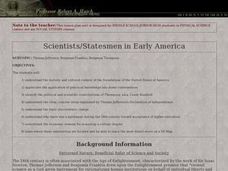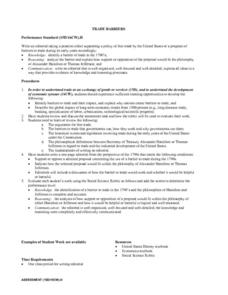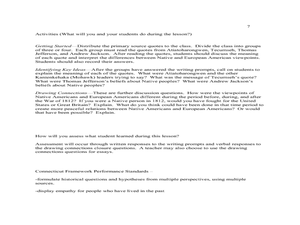National Constitution Center
Fourth of July (Grades 9-12)
Class members work to translate the Declaration of Independence into their own words, as well as design a Facebook page within the context of 1776 to raise public awareness about the document and its meaning for citizens.
Core Knowledge Foundation
Presidents and American Symbols Tell It Again!™ Read-Aloud Anthology
Scholars look into the country's current president, past presidents, the White House, Washington D.C., and the Declaration of Independence. They identify the flag, the Statue of Liberty, as well as Mount Rushmore and the significance of...
Core Knowledge Foundation
Early Presidents and Social Reformers
A unit by Core Knowledge begins with information about early United States presidents. Pupils then explore social reformers such as Sojourner Truth and Frederick Douglas, abolitionism, women's rights, and more. Participants listen and...
Core Knowledge Foundation
Frontier Explorers Tell It Again!™ Read-Aloud Anthology
The last read-aloud anthology in the series showcases frontier explorers. First graders listen to texts about Daniel Boone, crossing the Appalacian Mountains, Lewis and Clark, dangers on the prairie, and more. After reading, pupils...
Curated OER
The Making of the Declaration of Independence
Students can delve into how Thomas Jefferson's words in the Declaration of Independence changed history.
Curated OER
Louisiana's Indian Tribes At the Time of the Louisiana Purchase
Learners research primary readings concerning first hand accounts of the Indian tribes living in and around Louisiana's River systems. They complete a brief character sketch of each tribe characterized in the digital readings. These...
Curated OER
Roots of Religious Liberty
Young scholars examine the First Amendment and consider the contributions of James Madison and Thomas Jefferson. They review conflicts between the rights of Church and State and write a Madisonian argument on the issue.
Curated OER
Understanding the Declaration of Independence
Students identify and interpret the Declaration of Independence and the rights and privileges demanded in the document. They also identify how those rights and privileges have affected our history. Students then research about the...
Curated OER
Understanding James Madison The Father of the Constitution
Students research James Madison and create a table of his strengths and weaknesses. In this James Madison lesson, students read Jean Fritz's, The Great Little Madison, while developing their research skills, vocabulary strategies, and...
Huntington Library
The Corps of Discovery: The Lewis and Clark Expedition
Don't miss this fantastic comprehensive lesson plan on the Lewis and Clark Expedition, packed with instructional guidance, worksheets, map work, informational texts, and secondary source materials.
K12 Reader
The Greatest President
Who is the greatest US president? George Washington? Abraham Lincoln? FDR? Find out the opinions of your young historians with this cross-curricular writing prompt that engages them in researching the accomplishments of these influential...
Carolina K-12
The Revolutionary Times
Be sure to grab a copy of the Revolutionary Times! Scholars take a step back in time to report on topics set in the revolutionary period. Events include the ride of Paul Revere, the Battle of Saratoga, and more.
Stanford University
Declaration of Independence
Scholars work in pairs to decide whether leaders wrote the Declaration of Independence for the rich and powerful or for every man. To draw their conclusion, pairs read excerpts from two historians and complete a graphic organizer...
Constitutional Rights Foundation
The Troubled Elections of 1796 and 1800
Congress does more than create new laws. Political scientists delve into the elections of 1796 and 1800 to understand how political parties, the Electoral College, and personal agendas affected the election process. The resource also...
National Endowment for the Humanities
Ratifying the Constitution
Ratifying the Constitution was no simple task. Using primary sources, such as classic writings from the Federalists and Anti-Federalists, young scholars examine the arguments for and against the Constitution. They then decide: Would they...
Curated OER
Blessings of a Free Government: The Louisiana Purchase in 1803
Learners may take part in a multitude of activities listed such as creating political cartoons, comparison papers, and creating a portfolio to reinforce concepts and ideas surrounding the Louisiana Purchase.
Curated OER
Scientists and Statesmen in Early America
Explore the historic and cultural context of the foundations of the United States of America. They identify the political and scientific contributions of early American scientists.
Curated OER
Trade Barriers
Students write an editorial piece which takes a position supporting or opposing the free trade policy during the 1790s. After identifying barriers to trade in the 1790s they analyze how their position on the free trade would fit into...
Carolina K-12
Are You a Democrat or a Republican? Are You Really?
Have new or soon-to-be voters examine different political parties and their platforms as they figure out which one aligns most with their beliefs. After taking a few online quizzes, students split into pairs to discuss and then...
Curated OER
Nickel Knowledge
Students report facts found on Thomas Jefferson and the Declaration of American Independence. Students find the original words on the epitaph that Thomas Jefferson wrote for placement on his grave upon the time of his death. Students...
Curated OER
Interpreting Quotes From Native Americans and European Americans
Students examine the relations between Native Americans and European Americans in the late 1700's and early 1800's. In this Native American history lesson, students read and analyze quotes from Atiatoharongwen, Tecumseh, Thomas...
Curated OER
Memorable Museums
Second graders describe the impact of certain figures in United States history, including Thomas Jefferson, Meriwether Lewis, and iam Clark. They describe the general features of a community as well as specific features of their own...
Curated OER
Louisiana Purchase
Students use maps to locate and describe the area purchased by the Louisiana Purchase. In groups, they write a letter to Thomas Jefferson in which they evaluate the topography, climate and geography of the land. They determine the land's...
Curated OER
Early American Leaders
Young scholars discover what the qualities or characteristics of a leader are by describing the traits of the principal of the school, followed by the leader of the town, state and country. In this leadership lesson plan, students will...
Other popular searches
- Thomas Jefferson
- Thomas Jefferson Childhood
- President Thomas Jefferson
- Thomas Jefferson Picture
- Lesson Plans Thomas Jefferson
- Thomas Jefferson Presidency
- Who Was Thomas Jefferson
- Thomas Jefferson Activities
- Thomas Jefferson Memorial
- Thomas Jefferson Nickel
- Thomas Jefferson Timeline
- Thomas Jefferson Louisiana

























